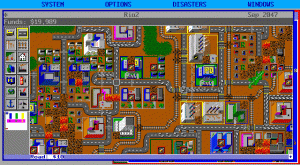

The six societal values are productivity, prosperity, creativity, spirituality, authority, and knowledge.

There are also six "social energies", called societal values, which allow players to learn about the characteristics of the citizens. Players do not build zones, a key element of past SimCity games instead, they have the ability to directly place individual residential buildings and work places, something not seen in previous editions, and similar to Monte Cristo's game City Life. Transportation networks have been simplified to dirt roads, paved roads, subways and bus stops. However, a downloadable update includes gameplay modes where a daily tax is incurred based on the buildings within a city. Instead, players get daily income from workplaces in the city. Public works and a tax system do not play a part in the basic game. While previous mainstream SimCity titles could be best described as mayorship, or "god" simulators, SimCity Societies is different, as foreshadowed by the previews and statements from the developers, by being a "social engineering simulator" rather than a city-building simulator.

Small commercial shops can be individually placed, a feature that was previously unavailable in mainstream 'Sim' titles (though SimTown, geared towards younger players, allowed the placement of individual buildings). SimCity Society takes the scale of the game down a level while players still tend individual cities, greater focus is given to the inhabitants, and building a society within the city. However, SimCity 4 (and previous SimCity games) were focused primarily on building the city, rather than tending to the welfare of the inhabitants. As with previous titles in the 'Sim' series, the overarching 'goal' of play is to construct a prosperous city. SimCity Societies greatly differs from its predecessor, SimCity 4. 1 Difference and Comparison to SimCity 4ĭifference and Comparison to SimCity 4.


 0 kommentar(er)
0 kommentar(er)
